Women leaders of The Church of Jesus Christ of Latter-day Saints (Mormons), from church headquarters in the United States, met with Wellington church and community leaders to discuss their common concern and relief efforts directed toward refugees, locally and worldwide.
They shared moving personal stories, some, of being refugees themselves, and some, of assisting refugees today.
Elder Kevin W. Pearson, Pacific Area president, with his wife June, presided at the luncheon meeting.
Sister Linda S. Reeves of the Relief Society general presidency and Sister Carol F. McConkie of the Young Women general presidency, along with their husbands, Melvyn Reeves and Oscar McConkie, are travelling throughout the South Pacific conducting leadership training, devotionals, and home visits.
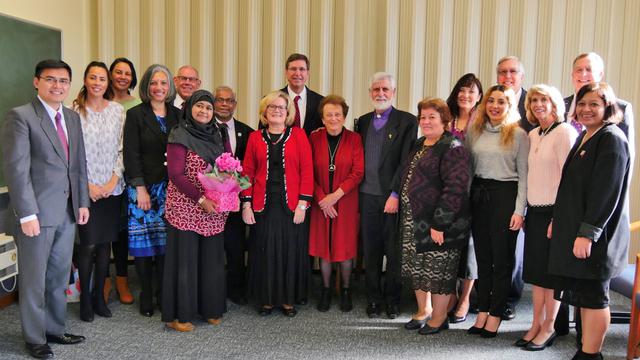
At luncheons being held in Melbourne, Christchurch, Wellington, and Papeete, the theme is “I Was a Stranger,” referring to the millions of people around the globe who have been forced to flee from their homes and countries.
The theme was first presented in April to the Relief Society’s worldwide membership of some six million women, inviting them to reach out in whatever way they can, wherever they live, to assist one or more of these refugees.
Guests at the Wellington luncheon included Mohammed Sultan Eusoff, CEO of the Federation of the Islamic Association of New Zealand and his wife Alimah; Father Aprem Pithyou QSM of The Ancient and Apostolic Catholic Church of the East, accompanied by his wife Juliet, and daughter Miriam; and Inge Woolf, Director of the Wellington Holocaust Centre.
Also attending was Elder David J. Thomson and Sister Kim Smith, both local leaders of The Church of Jesus Christ of Latter-day Saints.
Sister McConkie opened the meeting saying, “There are well over 60 million people who have been displaced from their homes and their resources. Our ability to support and assist them is an honour and a privilege as they flee for their lives, hoping to find safety and freedom from oppression.
“We have the opportunity to reach out, to love them, and to assist them.”
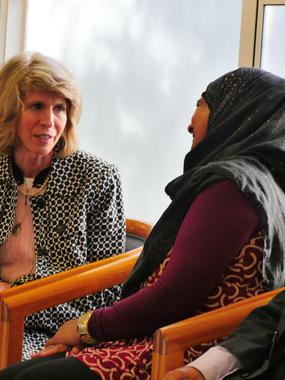
She continued: “In The Church of Jesus Christ of Latter-day Saints we have both a doctrine and a heritage of assisting the poor and needy.
"In the scriptures, the Saviour taught that we must reach out and love others. It is critical to our salvation. We believe that we stand in the place of the Saviour in ministering to other people.
“It is also our heritage. Mormons have a history of being persecuted, run out of their homes, having to leave everything behind so that they could find safety and security in another place.
"This video," she said, "When We Were Strangers, portrays that background which provides motivation for our desire to reach out to love and lift and help others who find themselves in that same situation."
Following the short video Sister McConkie said, “In the women’s meeting of our general conference last April, Sister Linda K. Burton, who is the Relief Society General President over all the women in the Church, extended an invitation to them to prayerfully consider what they can do to participate in serving refugees, and migrants, and all others who stand in need.”
McConkie went on: "Just as our people were blessed by those who were willing to offer up their goods and their kindness, we feel that is our responsibility now. We recognize, as we do so, the joy of giving of ourselves to those who stand in need as they seek to resettle and lift themselves out of poverty.
“In an effort to invite others to participate in that effort, we have a website called "iwasastranger.lds.org" and on that website is an opportunity for people to go and learn about resources, places where they can get involved, ideas for what they can do, specific needs of those who are suffering, and also an opportunity to share their experiences with others so that others can be inspired by their efforts and feel inclined to also participate."
McConkie said that within hours after the website went live, emails of people's experiences as they began participating in the effort starting coming in so quickly they could hardly read them all. "In reaching out to assist others, people have found their own sense of place and identity."
She concluded: "The Church’s effort is not just with people of our belief, but all refugees and migrants from any background. This is not about religion, it’s not about politics, it’s not about race. There are no barriers to this work, because we believe that all people throughout the world wherever they live are beloved sons and daughters of a God who loves them."
As Mohammed Eusoff addressed the group he said, “When we received the news that refugees were coming here [to Wellington] we, in a typical New Zealand fashion, opened our arms to welcome them. What touched our hearts is that people are still feeling for their fellow human beings who are in difficulty.
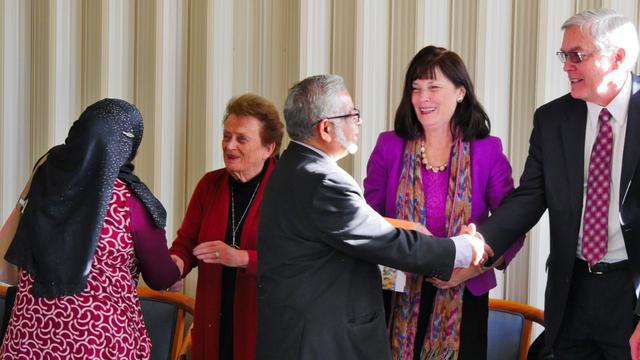
“So, in that fashion, the Muslim community welcomed and we were ready to share our resources, to heed the call of the government and work collaboratively with other groups. True to our faith, we are ready, and we also don’t see differences in race or religion. We are one human race, and it is our duty that we have to do this.
“We are looking toward the future refugees and have gathered the volunteers and ensured that they are able to assist the migrants and refugees that are coming here. We stand shoulder to shoulder with the other faith groups in opening our doors and our hearts to these people.”
Eusoff offered a prayer, ending with, “We stand in awe and gratitude for Your persistent love for each and all of Your children—Christian, Jew, Muslim, as well as those with other faiths. Grant to all, and our leaders, attributes of the strong; mutual respect in words and deed, restraint in the exercise of power, and the will for peace with justice for all.”
Father Aprem, originally from Ninevah Iraq, came to New Zealand in 1989 and became a leader of his people here. He has helped hundreds of refugees since then.
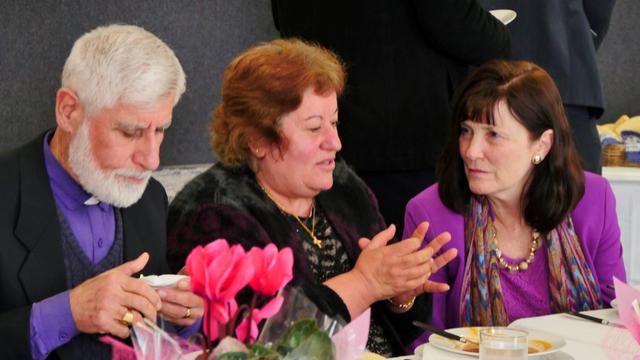
He related the struggles he and his family had, beginning with the revolution of 1958. He said, “So from then, Iraq’s not stable, and we lived a very difficult, very dangerous life there. Then there was the war between Iraq and Iran. I served eight years and six months in the service, but at last, I decided to flee with my family.
"I took my wife, my four children, my parents and in-laws. We were about 52 people in all, 15 of them children," he said. "We were walking for 20 days carrying our luggage and children. It was very hard, very dangerous to cross the very high mountains and the borders of Iraq, Iran, and Turkey. We had to walk at night and be silent because there were militias everywhere. We had to be very careful as we passed by because if they heard us, they would shoot us."
Aprem said, “The Iranians were very good to us for three years while we applied everywhere to be accepted as refugees. We were very happy to finally be able to settle here in New Zealand. People have been very kind to us as we started our new life here. But, we need to get more of our people out."
Inge Woolf, a child survivor of the Holocaust from Vienna, Austria, spoke next to the group.
“Although my family’s experience was a long time ago, I believe that nothing much has changed in the way people feel when they are forced to flee from everything they have known and everyone they have known and loved to a new country where everything is unfamiliar, the customs, the climate, the language, and the food. Also they have no family support, no older people to guide them and help with childcare and no familiar friends to socialize and swap notes with. Often they have spent their last penny getting away so they have lost the standard of living to which they are accustomed.”
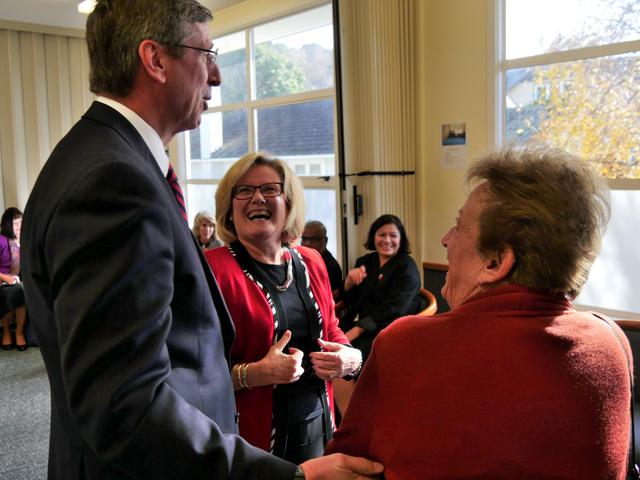
Woolf said,“I was a protected and loved only child, but the fears I experienced at that time stay with me nearly 80 years on and manifest themselves physically as a knot in my stomach when I think of them.”
After arriving in England as refugees, her father served in the British army and her mother worked as a seamstress, “but there was never enough money. We lived in a series of lodgings, sometimes consisting of a single room where we slept, cooked, lived and worked. Even 20 years later, just before we left for New Zealand, once again selling everything we had for the fare here, we had not been able to get out of the poverty trap.”
Her family thrived in New Zealand, building successful businesses and creating jobs for other immigrants.
“My experience tells me that most importantly, you need to have good people around you, neighbours or people from the community who offer themselves as mentors and guides to a different society. One-to-one relationships are the way that barriers are broken down most easily," she said.
“New Zealanders take people as they find them and befriend them regardless of where they were born. Once the newcomers have been encouraged to cheer for the All Blacks, accept the fluctuations of the weather, they can expect to be accepted as Kiwis," she smiled. "If this doesn’t happen for the first generation it certainly happens for the second.”
Woolf said, “Typically, refugees have a determination to succeed. It has driven them to move their families to seek a better life, no matter what the risk. So they are hardworking, if given the opportunity. As an employer, I once had in our small team a Chinese and a Yugoslavian, neither of whom could speak much English when they first came to us, but both proved to be the most hardworking, loyal and successful people we had ever employed. They are still our friends.
“The children of refugees are strongly encouraged to excel in education and soon take their place in the top ranks of our professions. I firmly believe that access to language classes and good education programmes are vital in the resettlement of refugees," she said.
In complimenting New Zealand for the refugee assistance it provides, she listed several organizations providing services: Red Cross, ChangeMakers Refugee Forum, Refugee Trauma Recovery, AEN (Aotearoa Ethnic Network), telephone interpretation services, online helps, and religious organizations.
Woolf continued, “However, today’s refugees, unlike the European families displaced in my time, have extra problems to face, as they come from countries whose cultures and values are hugely different to the Western culture practiced here.
“The greatest challenge they face is in taking onboard the values of their new home, while still keeping the cultural and religious ties to the country of their birth," she said.
“The greatest challenge that New Zealand faces is in integrating these newcomers happily and safely into citizenship, and to do so without diminishing the values that our society holds dear.
“We should not underestimate these challenges nor the benefits that flow when they are successfully met,” she concluded.
Sister Reeves closed the meeting by expressing appreciation to all for their presence and participation and for their concern for and assistance with refugee causes.
“We loved hearing from each of you, hearing your stories, and feeling of your hearts and the love that you have for all people,” she said. “As difficult as this situation is, with so many people displaced across the world, it gives each of us the opportunity to reach out and love."
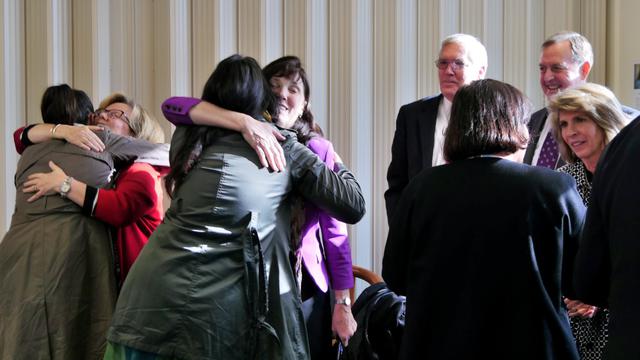
Sisters McConkie and Reeves, along with President Pearson and their spouses will conclude their tour in the Pacific Area with meetings in Tahiti. They encourage all who would like to assist in the refugee effort to seek individuals and groups that are providing assistance in their area of the world and offer their help. Or, go to the website iwasastranger.org to see many suggestions of ways to assist.